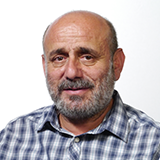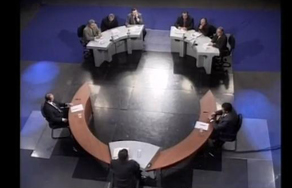During the second stage of the 2003 presidential election in Armenia, the first and currently the only televised debate in Armenia’s history between two candidates, Robert Kocharian and Stepan Demirchyan, took place. And that, as mentioned elsewhere, was not so much a debate as it was a question and answer period — and the questions were formulated with the obvious intention of cornering the opposition candidate.
During the campaign period of the last presidential election in 2008, the Yerevan Press Club (YPC) launched a series of televised debates on the Yerkir Media channel. Six episodes were planned — representatives of the candidates’ election campaign teams would debate in the first three episodes, while the candidates themselves would debate in the last three. The project outcome, unfortunately, wasn’t satisfactory. In the first episode, only one candidate’s representative showed up. The second and third episodes were relatively more successful — all three of the guests per episode showed up to the debate. But the second part of the series, in which the candidates themselves debated, despite the YPC’s persistent efforts, essentially failed — and it was the candidates’ fault. In one episode, no one came, and experts were forced to debate, while in the other two, showing up to debate were one candidate and six representatives. (To find out more about this project, see the YPC’s January 2008 and February 2008 weekly newsletters.)
Why did I recall these developments of 10 and 5 years ago? I think it’s obvious. During this year’s presidential election, not even the minimum, a debate among candidates’ campaign representatives, happened. Though the YPC (joined by other organizations including the Committee to Protect Freedom of Expression, Internews Media Support NGO, and Asparez Journalists’ Club) urged such debates to happen, the response was negligible. A debate was initiated essentially only by RFE/RL’s Armenian service (Azatutyun Radio), though two of the candidates for various reasons refused the invitation and didn’t show up.
I won’t go into the reasons why candidates refuse debates — that’s not the issue of this piece, though I myself believe that not being able to debate face-to-face is one of the greatest shortcomings or perhaps greatest displays of arrogance (“Who is he for I to debate with him?”) of Armenian politicians. Probably giving monologues, characteristic of this (why only this?) election campaign, is easier: there’s no one disputing you and you can say whatever you want… And if later, another candidate in his monologue objects to something you said, at your next rally or meeting you can respond with a witty comeback — in other words, have a debate over distance. But is this a good thing? After all, only a face-to-face debate between candidates allows voters to see the differences in their proposals, programs, and approaches in comparison. Not to mention the fact that such debates generate great interest and gather large audiences.
In any case, what concerns me more is the behavior of the news media in this matter — especially national TV stations, which are the most influential, didn’t organize televised debates or if they did, were unable to gather the candidates face to face for a conversation.
The aforementioned Jan. 25, 2013 statement issued by YPC and other organizations reads in part: “It would be reasonable if the First Channel of the Public Television of Armenia is the first to come up with such an initiative, given its special mission.” And in my opinion, that’s the worse of all, that Armenia’s state broadcaster didn’t organize a televised debate (in any case, it is unknown to us whether it took such an initiative) — in that case when it is obliged to serve the public’s needs. And at this stage, these needs also include debates.
What to do then, when TV stations don’t take the initiative and candidates don’t want to participate in public debates?
I think the matter can be solved through legislation. I propose adding a provision to the RA Electoral Code that would oblige Armenia’s public broadcaster to organize debates between candidates during presidential election campaign. I don’t think this will interfere in the independence of news media. It simply will define by law the public’s right to receive complete information about candidates’ proposed programs. But requiring this only of public television is not enough — because the TV station will organize the debates, but candidates won’t come. And so, it is necessary to add another provision to the Electoral Code that would oblige candidates to participate in at least one (perhaps two or three) televised debates.
Mesrop Harutyunyan







